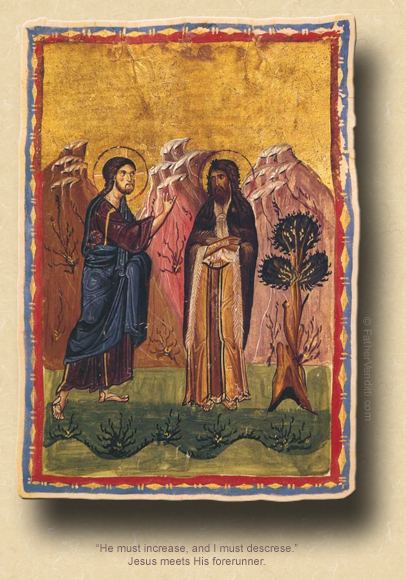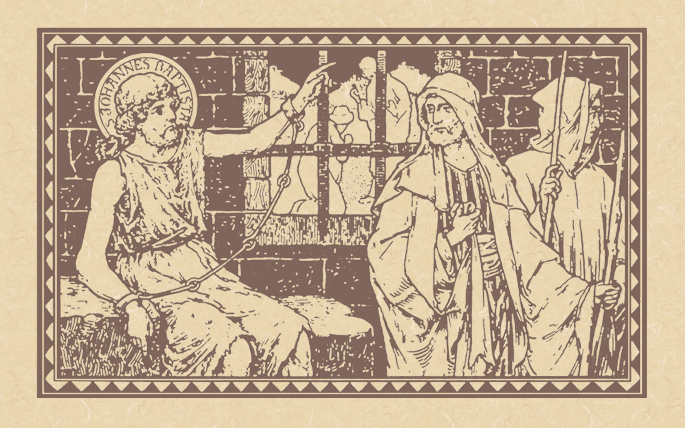He Must Increase; I Must Decrease.
The Saturday after Epiphany.
Lessons from the feria, according to the ordinary form of the Roman Rite:
• I John 5: 14-21.
• Psalm 149: 1-6, 9.
• John 3: 22-30.
The Fourth Class Feria of the Blessed Virgin Mary on Saturday.
Lessons from the common "Vultum Tuum…" of the Blessed Virgin, according to the extraordinary form of the Roman Rite:
• Titus 3: 4-7.
• Psalm 44: 3, 2.
• Luke 2: 15-20.
FatherVenditti.com
|
 9:55 PM 1/11/2020 — This last day of the Epiphany season brings us back, appropriately enough, to the Baptist, today's lesson from Saint John presenting to us the concern of some of John's disciples that Jesus, whom we are told has also begun to baptize, is stealing some of John's thunder. 9:55 PM 1/11/2020 — This last day of the Epiphany season brings us back, appropriately enough, to the Baptist, today's lesson from Saint John presenting to us the concern of some of John's disciples that Jesus, whom we are told has also begun to baptize, is stealing some of John's thunder.
Forgive me for reminding you of what Saint Augustine said in the 4th century on how the Church decided on the date for celebrating the birth of John the Baptist:—and you’ve heard me mention this a couple of times—clearly, no one knows for sure when so many of these events actually occurred; and, he points out that the date for celebrating the Baptist's birth, which is in June, was chosen because of its proximity to the Summer Solstice when the days begin to grew shorter, as opposed to the Nativity of our Lord, which corresponds to the Winter Solstice when the days start to grew longer, which he says is consistent with the remark made by John the Baptist in today's Gospel lesson, whereupon being told that Jesus has begun to baptize as he was, says, “He must increase; I must decrease” (John 3:30 NABRE). Which, when you think about it, is the quintessential statement of the interior life for the Christian: our goal should be to reproduce in ourselves the life of Christ so perfectly that we ourselves begin to disappear and Christ begins to show through us in perfect purity.
During these dual seasons of Christmas and Epiphany we've been treated to so many lofty commemorations of events with deep theological significance. We venerated the Mother of God as She received from the Angel the Divine commission to be the portal of salvation and give birth to God upon earth. We adored the Infant in the cave at the Nativity. We offered the gift of our lives lived in grace along with the spiritually symbolic gifts brought by the Magi: gold for the King, frankincense for the High Priest, and myrrh for His burial. Tomorrow, the Epiphany season will end with the Feast of the Baptism of the Lord, and we will marvel and rejoice at the appearance of the dove and the announcement of the Father’s approval; but, as we shall be reading in the days that follow, the Gospel doesn’t stop there, and neither should we. Having experienced all of these things—bringing them about by His Divine will—Jesus the Man will now put sandals on His feet, throw a pack on His back, and begin to trudge the width and breadth of Galilee preaching the evil of sin and the need to do good. And if we want to be counted as His followers, which I'm sure we do, then we have to go along. The word, “Christian,” does not mean “believer in Christ,” although that is implied; what it really means is “follower of Christ.” And one cannot follow simply by believing and standing still. Following requires movement; it requires doing; it requires living.
We can come here day after day, praying the Holy Sacrifice of the Mass with as much devotion as we can muster, swearing to everything believed and taught by the Church of Christ, and all the while thinking that these are the things that make us Christians. But how are we living? What is it that we do when we’re not here? Do we actually live the way Jesus showed us and taught us to live—the way His Church continues to show us in his name through the Apostles? Are we really followers of Christ, or are we simply spectators in the bleachers, watching the world go by, contenting ourselves with the false security that we believe in all the right things?
The values our Church believes and teaches, and the way of life we are supposed to follow as Christians, are not the values and the ways of the world around us. Christ asks us to live in the midst of this world without being a part of it, and that’s not easy. We are tempted every day, and often we fall. The secret to surviving it all with our faith intact is to take as our motto the Baptist's last words in today's lesson: “He must increase; I must decrease.”

|

